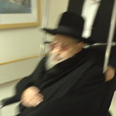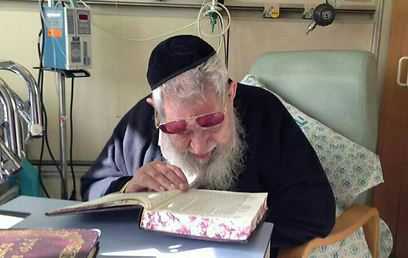
While President Shimon Peres telephoned Rabbi Ovadia Yosef on Sunday, the general press expressed an interest in his condition and religious Zionist rabbis prayed for his recovery, some in the ultra-Orthodox public appeared to remain indifferent to stroke suffered by Shas' spiritual leader over the weekend.
Three of the sector's four daily newspapers completely ignored the former Sephardic chief rabbi's medical condition the day after his hospitalization, failing to report about the stroke or call on the public to pray for Yosef's recovery.
Hasidic newspaper Hamodia was the only one to address Rabbi Yosef's hospitalization, on its front page, but the other three dailies – Hamevaser, Yated Ne'eman and Hapeles – did not mention a single word about it.
Haredi websites, on the other hand, published dozens of reports and updates on the matter immediately after Shabbat, and radio stations offered special broadcasts in light of the situation.
'Their prayer will ruin things for him'
Yosef's followers in the Sephardic haredi public said that political and halachic disagreements had driven the Ashkenazi public activists controlling these papers mad, to such a degree that they cannot care for the rabbi's wellbeing – although he is "one of the greatest of the generation."
They noted that the Shas journal, Yom Leyom, rose above such disputes and offered comprehensive reports about such incidents when they happened "on the other side."
Former Shas spokesman Itzik Sudri, an associate of Rabbi Yosef, commented cynically: "I can only try to speak positively about the haredi journalists and editors who didn’t write a word about Rabbi Ovadia's hospitalization and the prayers. They must be aware of the fact that they are complete villains and that any prayer on their part will only ruin things and hurt our rabbi even more. So I understand why they avoided publishing the matter."

Rabbi Ovadia Yosef in hospital. Not a word in Ashkenazi papers
A senior source on the Yated Ne'eman editorial board rejected the claims, explaining what led to the decision not to report on Rabbi Yosef's condition.
He said that Rabbi Shmuel Auerbach, the leader of Yated's rival faction in the Orthodox Lithuanian community, was hospitalized last month for cardiac catheterization, and the newspaper's editors decided to ignore the matter for fear of being accused of "malicious joy."
Therefore, as they didn't report about the medical condition of a senior rabbi from their own community, members of Yated's spiritual committee ruled that they should not cover a similar medical incident involving Rabbi Ovadia Yosef, who is the leader of a different public.
"Perhaps we could have found a solution and posted an ad calling on the public to pray for his recovery, and then it would allegedly not have been on behalf of the paper," the source added. "But, thank God, the rabbi's condition was not that serious."
He noted that the paper did not write about the hospitalization of Rabbi Aharon Leib Shteinman, who Yated Ne'eman is subject to, several months ago either – for the same reason.
In general, he said, the paper's policy in such cases is not to get dragged into "paparazzi and voyeurism," but to settle for a "dry report" and a call for prayer – which is not always necessary. It was the same case, he said, during the illness of late Rabbi Yosef Shalom Elyashiv, leader of the Orthodox Lithuanian community.
Yaakov Porush, director of Hamevaser's editorial board, explained the decision to ignore Rabbi Yosef's condition as well: "Hamevaser is the only haredi daily with personal contact with the rabbi's home, and everything they ask for is included in the paper.
"Yesterday they didn't ask for it, and in sensitive situations like these we definitely wouldn't have done it without a request on their part.
"Usually, when one of the great sages of Israel doesn’t feel well, we include a report only at the request of the family members, because it's sensitive – and that's what we did in this case as well."
Hapeles CEO Yaakov Levine said that such issues were not normally covered by his newspaper as well – unless the family calls on the public to pray.
He noted that the newspaper acted the same way in regards to a number of senior rabbis who were recently hospitalized, including Rabbi Shmuel Auerbach.
"This is gossip which the public has no interest in," Levine added.















